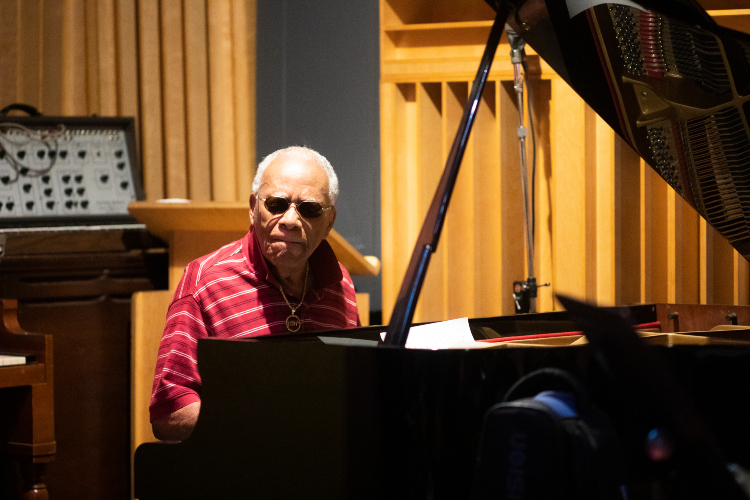|
Getting your Trinity Audio player ready…
|
In the second part of our Conversation with Lonnie Liston Smith (read part one here), we discuss his time with Miles Davis, his work with the Cosmic Echoes, and his discovery of a young Marcus Miller.
PostGenre: After Pharaoh Sanders, you joined Miles [Davis]’ band. You were even part of the session for On the Corner (Columbia, 1972). Many, including some musicians on the record, did not fully appreciate at that time what Miles was trying to accomplish with that album. Did you understand what Miles was going for as you recorded On the Corner?
Lonnie Liston Smith: That’s interesting because Miles was doing a lot of experimentation at that time. But a lot of people were. Sun Ra and a bunch of other people were more “out” in their music. I heard someone say, “From ragtime to no time.” That covers everything. Miles was doing it his way. We were all playing pieces of it. It wasn’t until after everyone finished and they started mixing the recording that it came together. It was just Miles and [producer] Teo [Macero], who put it all together, and made sense of it.
On the Corner had three of us playing keyboards, Herbie [Hancock], myself, and another young pianist. Having all three of us playing at the same time was another experience I had never had until then. We couldn’t all play the same thing, so we really had to listen and create. Miles was experimenting, and it worked. But a lot of people don’t realize they have to give Tony Williams a lot of credit for Miles was doing because Tony’s Lifetime really kind of started [fusion] before Miles and the rest of them.
PG: George Coleman has suggested that Tony was the one who kept pushing Miles to be more and more experimental.
LLS: Oh, that’s good. That makes sense ‘cause Tony was a brilliant young drummer. But Miles was a genius. If you notice, everyone that’s played with Miles, once they left him, automatically formed their own group. Miles makes you a much stronger person.
PG: That certainly seems to be the case with you, as you became leader of the Cosmic Echoes after leaving Miles.
LLS: Yeah, but before we get to that, let me share an interesting story about Miles.
PG: Of course.
LLS: So we did On the Corner and, I think, one other record.
PG: Big Fun (Columbia, 1974).
LLS: Right. After that, Miles asked me to go on tour with him. I thought it would be a good opportunity to get deep into the Fender Rhodes. So, I went over to Miles’ house to rehearse for the tour, and I don’t even see a Fender Rhodes there. I said, “Well, Miles, what am I supposed to play? I don’t see a Fender Rhodes.” A Japanese company had just given Miles a new electric organ. Miles said, “I’m tired of Fender Rhodes. Herbie Hancock played it with me. Chick Corea played it with me. Joe Zawinul played it with me. I want another sound. I want you to play that.” And he pointed to the electric organ. I said, “Well, Miles, I’ve never played that before. He said, “Oh, don’t worry.” I asked him if I could take it home to practice. He didn’t let me because he always wanted musicians to be very creative and spontaneous in the moment. So, I had to get used to the instrument on stage. I had to learn to be spontaneous and creative.
The funny thing is that years later, I found an interview with Chick Corea where someone asked him about the Fender Rhodes. Chick said that he had never played it until he joined Miles. He didn’t even want to play it, but that is what Miles wanted, so he started playing it and had to get used to it. And look what Chick was able to do with the Fender Rhodes during the rest of his career.
PG: Did you enjoy playing the electric organ? It does not seem like you played it much after leaving Miles.
LLS: Oh, it has a different sound. It wasn’t an organ like Jimmy Smith. It was just like a regular keyboard. But it had all these different sounds. So I just got into it, from the perspective that I would just work with the sounds. In the band, we had a Badal Roy from India playing tabla, two drummers, and electric guitar. It was all kinds of different instrumentation. But the experience definitely made me a stronger player.
PG: Not long after Miles, you started your band, The Cosmic Echoes. Your music with that group generally sounded more gentle and peaceful than much of the music you made with Pharaoh, Miles’ Stockhausen-influenced work, or even the line of albums you recorded with Gato Barbieri in the early 70s. Did you ever encounter resistance from people in the music industry or fans for not following a more avant-garde-influenced approach to music with The Cosmic Echoes?
LLS: No. I guess when Expansions hit, it just took off worldwide, and everyone kind of fell in love with it. But, in general, you can’t let what people say bother you. Man, after Bitches Brew (Columbia, 1969) came out, some people wanted to murder Miles. But he didn’t let it bother him. Eventually, almost everybody came around. As an artist, you have to go and be yourself. You know what’s inside you and hear it before anyone else does. A lot of times, the audience or the critics may take a while, but they usually come around.
PG: You released several excellent albums in the 1970s. Why do you think Expansions, particularly its title track, is your work from that period that people seem to flock to the most?
LLS: Well, I guess it’s because so many of us grew up listening to James Brown and the funk he laid down. It’s just incredible. Even down to Bootsy [Collins], all of funk came out of James Brown. With Expansions, I wanted to put James Brown’s sound on the bottom so people can dance to the music.
Then I wanted to add some positive lyrics to give people hope and encouragement. We were still gonna improvise, as we did in our time in jazz. We used the same types of chords that you use in straight-ahead jazz. So I just tried to put all that together, and when people heard it, they said, “Oh man, that’s what we wanted.” When I first went to London, after Expansions came out, someone even called me the godfather of jazz fusion.
PG: One distinguishing feature of “Expansions” is the track’s use of the triangle. Where did the idea to use the triangle come from?
LLS: You know, many things happen when you’re in the studio. I don’t exactly remember how the triangle came in, but I think we heard one of the guys with the percussion just doing something with it, and one of us said, “Oh man, that’s a great idea. Let’s do that.” A lot of things like that happen spontaneously in the studio. You might hear a sound or something, and it ends up becoming a big thing.
PG: Some people have referred to Expansions as a precursor to smooth jazz. Do you think “smooth jazz” was a natural development upon the jazz-funk fusion records of the 1970s?
LLS: Oh yeah. For both, we still preferred music using the same chords and chord structures as in straight-ahead jazz. And we were still improvising. The rhythms changed, but so many other things remained the same. It is kind of like if you listen to Miles. He played the same way when he did straight ahead as he did in the 70s or 80s. It’s just that everything else had changed around him. Many people don’t realize that even as the environment changes, the artist you love is still the same artist as before. Maybe the rhythm has changed, or the instrumentation has changed. But it’s still the same artist.
PG: Since you mentioned Miles’ 80s work, you discovered Marcus Miller when he was very young.
LLS: Oh yeah, he was 18 or 19. He was just jamming somewhere. Marcus was playing bass, and it sounded good. After a while, he took a break, walked over to me, and said, “I think I got a song you would like.” He sat down at the piano. I didn’t even realize he could also play the piano at that point – and the song he came out with was “Journey into Love.” I had a record date coming up, I think it was for Loveland (Columbia, 1978), so I brought Marcus into the studio. Once everyone heard him, the rest is history. It’s as Miles and I used to discuss – sometimes you hear these young artists and can just tell, “Oh, all right, that’s the future. He’s going to be great one day.” And that’s how it was when I first worked with Marcus.
PG: Are there any young about whom you feel that way today?
LLS: Well, I don’t live in New York anymore, but there are a lot of young ones out there. At least there’s still hope for the music. Lately, especially since the pandemic, I’ve been discovering a lot of music from YouTube and TikTok. There’s a lot of great music out there that I wasn’t aware of. There’s still a lot of great talent out there.
JID017 is now available. It can be purchased on Bandcamp or Jazz is Dead’s website. More information on Smith can be found on his website.







Leave a Reply